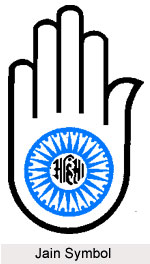 Kshamavani or "Forgiveness Day" is an auspicious occasion of the Jains. On this day the followers of Jainism beg for forgiveness for their intentional and unintentional wrongs, excesses, sins, that they might have done to anyone. It is celebrated on the Samvatsari, i.e. the last day of the Paryusana Parva that is celebrated every year. It coincides with the Chaturthi, 4th day of Shukla Paksha, in the holy month of Bhadrapad.
Kshamavani or "Forgiveness Day" is an auspicious occasion of the Jains. On this day the followers of Jainism beg for forgiveness for their intentional and unintentional wrongs, excesses, sins, that they might have done to anyone. It is celebrated on the Samvatsari, i.e. the last day of the Paryusana Parva that is celebrated every year. It coincides with the Chaturthi, 4th day of Shukla Paksha, in the holy month of Bhadrapad.
Observance of Kshamavani Parva
Kshamavani Parva is the function of forgiveness. Forgiveness is regarded as the first and foremost virtue of Jainism. Thus on this day all the members belonging to the Jain community approach their relatives, friends, colleague and begs pardon from them for all faults or mistakes that they might have committed knowingly or unknowingly. Every member confesses their faults to each other and of other religion also and apologies for it. According to Jainism forgiveness is a virtue of humility that helps one forget his anger and makes religious minded. It also helps in eradicating all sins.
Kshamavani Parva helps the members to start their social life afresh by removing all annoyance. Every Jain on this auspicious day, dedicate themselves heart and soul to adhere to their popular slogan `Live and Let Live`, for peace and happiness. While asking for pardon they use the popular phrase "Micchami Dukkadam." It is a Prakrit phrase which means, may all the evil that has been done become fruitless.
According to Jainism, by asking for forgiveness and by forgiving others one purifies his soul. Lord Mahavira said we should forgive our own soul first. To forgive others is a practical application of this supreme forgiveness. It is the path of spiritual purification. The soul also becomes purified by getting rid of its sins hence it becomes for it to follow the path of truth and attain salvation or nirvana. Forgiveness is part of ahimsa. Lord Mahavira also emphasized much upon forgiveness and practicing ahimsa. He said one should forgive his own soul first. To forgive others is a practical application of this supreme forgiveness.
Jains classify forgiveness as: gifted by the one who forgives, earned by the one seeking it, and natural as a part of our divine nature. According to them forgiveness can be earned by request or prayer, pratikraman or confession and penitence.




















